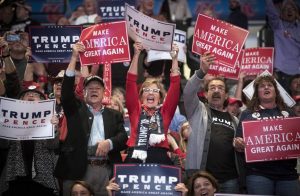Newspaper Article 09/12/2016
Donald Trump’s victory in the US Presidential elections has come as a surprise. It has nullified the assumption that political experience is a must for Presidency. Hillary Clinton’s political credentials and government experience could not take her to the White House. President Trump, the 45th US President, will assume the charge of White House in January 2017. Trump during the election campaign pledged to have tough immigration policies, deport illegal immigrants and build a wall to prevent illegal immigration from Mexico. The racial remarks against the Mexicans, Blacks and Muslims might not be well received by the immigrant communities living in the US. The white supremacy in relation to the outsiders (immigrants) may prompt hatred at the societal level. Noam Chomsky, Professor Massachusetts Institute of Technology (MIT) described Trump’s victory as “an outcome of a decrepit society heading strongly towards collapse.” Another angle to Trump’s victory is that the harsh language is painful, but the use of force hurts the most. The American coercive drive in Iraq in search of WMD and Afghanistan against terrorists led to death and destruction. The public’s vote for a new political setup is to rectify the past policies. The US involvement in multiple theatres abroad (simultaneously) affected the country’s economy, and in this backdrop, the American public has many expectations from the new government and reduction in taxes would be a major one.
Trump’s support for relations with Russia and cooperation with the latter against extremists is a marked shift from the past. Trump has also been critical of the US spending in NATO, and suggested to pull out of the alliance. Trump has questioned the worth of the US-Japan alliance and said Japan needed to pay more to maintain US troops on its soil (Japan spends $ 1.7 billion on US support, including the costs of running US bases). Trump’s remarks on the US-Japan alliance have send alarming signals to the Northeast Asian state. Prime Minister Shinzo Abe’s recent visit to New York (17 November 2016), on his way to Peru (to attend Asia-Pacific trade summit) is significant in this regard; ahead of the meeting, Prime Minister Abe said he wanted to “build trust” and “work together”.
The US activism in East Asia as well as ASEAN region witnessed an upward trend during Obama administration. The strengthening of politico-economic and military ties with the regional states were attempts to contain China’s influence. Regarding the US policy towards Asia, under the new leadership, Paul Haenle, Director of the Carnegie-Tsinghua Centre for Global Policy, Beijing remarked: “Much of the world seems convinced that Trump’s election signals the ushering in of a period of American isolationism in which Washington will retreat from the world, including from Asia, and abandon its allies.” On relations with China, Trump has expressed the concern of losing the jobs to Chinese, his remarks: “They come in, they take our jobs, they make a fortune. We are living through the greatest jobs theft in the history of the world.” The US markets are vital for the Chinese products. The US protectionism policy (if adopted) might limit the Chinese access to the US markets. However, China’s One Belt One Road (OBOR) initiative will provide the country with alternate trade options. The corridor will connect markets of Asia, Europe and beyond. Trump has also been critical of the Trans-Pacific Partnership – TPP agreement (with East and Southeast Asia minus China). The absence of TPP agreement might leave an opening for the Beijing-led Regional Comprehensive Economic Partnership (RCEP).
Seeing the Pakistan-US ties, currently, Islamabad features quite low in the US policy calculus. Pakistan needs to actively engage with the new administration. The strict visa policy towards Muslim countries is likely to affect Pakistan also but alone criticizing the policy of immigration is not a practical approach, we need to look at the developments from a wider perspective. The Pakistan-US relations are likely to revolve around counter terrorism, Afghanistan and nuclear non-proliferation. We need to project to the outside world that Pakistan’s democracy, military and strategic capability are it’s strengths and have unanimously fought the disgruntled elements. The Pakistani American diaspora could be pivotal in promotion of the soft power image.
Amna Ejaz Rafi
Researcher
Islamabad Policy Research Institute (IPRI)
Published in Pakistan Observer, December 3, 2016


